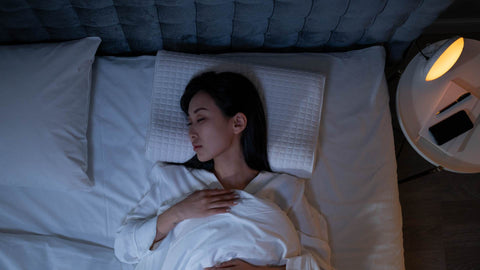Sleep quality can be significantly impacted by your bedroom temperature. Finding the right balance is crucial for a restful night.
Research suggests the ideal sleep temperature for most adults falls between 60-68°F (15.5-20°C). This range promotes better sleep quality by supporting your body's natural temperature regulation during the night. Your circadian rhythms are closely tied to temperature fluctuations, with cooler environments signaling it's time for rest.
For older adults over 65, slightly warmer temperatures between 68-77°F (20-25°C) may be more comfortable. Infants and young children often sleep better in rooms around 65-70°F (18-21°C). Adjusting your thermostat or using fans can help you find the sweet spot for your best sleep.
Understanding Sleep Temperature and Circadian Rhythm
Temperature plays a crucial role in regulating sleep patterns. Your body's internal clock, known as the circadian rhythm, interacts with environmental cues to influence sleep quality and duration.
The Science of Sleep and Temperature Regulation
Your body temperature fluctuates throughout the day, following a 24-hour cycle. This cycle is closely tied to your sleep-wake patterns. As bedtime approaches, your core temperature begins to drop.
This decrease in body temperature signals to your brain that it's time to sleep. The cooling process helps initiate sleep onset and promotes deeper, more restorative sleep stages.
During sleep, your body temperature continues to decline, reaching its lowest point in the early morning hours. This drop in temperature is essential for maintaining sleep quality.
Circadian Rhythm and Its Impact on Sleep
Your circadian rhythm acts as an internal timekeeper, regulating various bodily functions, including sleep. This biological clock is influenced by external factors such as light exposure and temperature.
As evening approaches, your body starts to produce melatonin, the sleep hormone. This increase in melatonin coincides with a drop in core body temperature, preparing you for sleep.
Maintaining a consistent sleep schedule helps reinforce your circadian rhythm. This, in turn, supports better sleep quality and overall health.
How Core Body Temperature Affects Sleep Stages
Your core body temperature influences the different stages of sleep. As you transition from light to deep sleep, your body temperature continues to decrease.
During deep sleep, your core temperature reaches its lowest point. This cooler state facilitates cellular repair and helps consolidate memories.
REM sleep, characterized by vivid dreams, occurs when your body temperature is slightly higher than during deep sleep. This temperature shift helps support the increased brain activity associated with REM sleep.
Thermoregulation during sleep is a delicate balance. Too warm or too cold environments can disrupt your sleep stages, leading to more frequent awakenings and reduced sleep quality.
Creating the Ideal Sleep Environment
Your bedroom setup plays a crucial role in achieving restful sleep. Temperature, bedding choices, and lifestyle factors all contribute to creating the optimal sleep environment.
Optimizing Bedroom Temperature for Quality Sleep
Set your bedroom temperature between 60-67°F (15.6-19°C) for optimal sleep. This range helps maintain a lower core body temperature, promoting better sleep quality. If you don't have air conditioning, open windows to allow cool air circulation.
Consider using a programmable thermostat to automatically adjust temperatures throughout the night. This can help you maintain consistent comfort without waking up to make adjustments.
Humidity levels also impact sleep quality. Aim for 30-50% relative humidity in your bedroom. Use a dehumidifier in damp climates or a humidifier in dry environments to achieve this range.
Bedding and Clothing Choices for Better Sleep Hygiene
Select breathable, moisture-wicking materials for your bedding and sleepwear. Cotton, bamboo, and certain synthetic blends are excellent choices. These fabrics help regulate body temperature and prevent overheating.
Invest in a cooling mattress or mattress topper to enhance temperature regulation. Memory foam infused with gel or copper can help dissipate heat more effectively than traditional materials.
Layer your bedding for easy temperature adjustments throughout the night. Use a lightweight comforter or duvet with a breathable cover, and keep an extra blanket nearby if needed.
Lifestyle Factors Influencing Sleep Temperature
Regular exercise can improve your sleep quality, but timing matters. Finish vigorous workouts at least 2-3 hours before bedtime to allow your body temperature to cool down.
Avoid heavy meals close to bedtime. Digestion raises your body temperature, potentially disrupting sleep. If you're hungry, opt for a light snack instead.
Limit caffeine intake, especially in the afternoon and evening. Caffeine can increase body temperature and make it harder to fall asleep.
Create a consistent bedtime routine to signal to your body that it's time to wind down. This can include activities like reading, gentle stretching, or meditation to help lower your core temperature before sleep.



